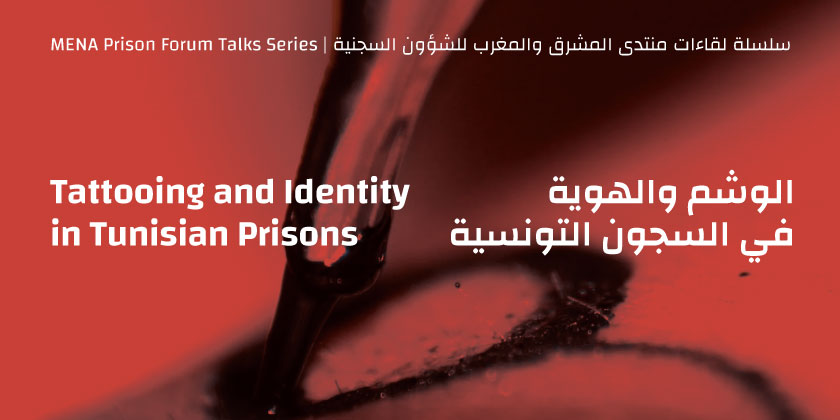
Photo: Courtesy of Matt G. Borowick (CC by 2.0)
TATTOOING AND IDENTITY IN TUNISIAN PRISONS
A conversation with Karim Abdessalem
Via Zoom
JUL 21, 2022
On July 21, 2022, The MENA Prison Forum was pleased to host the second talk with former detainee, human rights activist, and researcher Karim Abdessalem. After speaking with the MPF about the Al-Zindali, a genre of Tunisian prison music, on July 7, 2022 this second session investigated the political and social significance of tattoos in the Tunisian prison system. During the talk, Abdessalem noted how at the gate of every prison, prisoners lose all their belongings, their identity cards, and any items that can reflect their identity: in the eyes of the jailers, they become just numbers. However, prisoners can refuse this loss of identity through tattoos, and the talk emphasized how these acts of corporal modification take the form of self-identification, psychological signifiers, and even biographies and personal narratives. From forced and compulsive tattoos for stigmatization and torture, to voluntary tattoos as part of constructing an identity, a sense of belonging, and perhaps pride, the talk moved past the aesthetic, artistic, and adornment phenomenon of inked bodies, and instead delved into the charged meanings and connotations of tattoos in Tunisian prisons.
During the talk, Abdessalem noted how tattoos not only shape the relationship between the prisoner and his body, but also between him and his co-inmates. Moreover, he articulated the need to investigate prison tattoos in light of their meanings with respect to the broader Tunisian society. Within this context, Abdessalem verbally countered the isolation of the prisoners by integrating them into social and cultural practices ‘outside’ the jails. Moreover, he pointed to the techniques the prisoners used to ink their bodies despite the lack of professional machines and tools.
Abdessalem further emphasized that a topic like tattoos bring ‘criminal’ prisoners to the discussions of cultures and histories of incarceration in the MENA region. Abdessalem is a member of the International Network of Victims and Survivors of Serious Human Rights Abuses (INVOAS) and a close partner of MPF in Tunisia and North Africa, and his work attempts to counter rigid lines that divide ‘criminal’ prisoners from ‘political’ prisoners that is often found in human rights reports as well as academic research. He stated that the bodies of the prisoners do not care about categories, as all prisoners, criminal and political, need to drink, eat, and take care of their bodies. Therefore, while tattoos might differentiate from and further belong to the ‘criminal’ more than the ‘political’ prisoner, we should pay attention that both categories shape the everyday lives of the jail.
During the Q&A session, the audience added their inputs to Abdessalem’s talk by bringing examples from the contexts in which they themselves were detained. The MPF’s role as a meeting point for former prisoners across the MENA region was enhanced with Ahmed Abdel Halim, a former Egyptian prisoner, who noted that in his experience in Egypt, prisoners with tattoos can be both political and criminal. Abdel Halim, who published a log and a book with the MPF about the politics of incarcerated bodies, admired Abdessalem’s work and promised to extend his future research to Tunisian prisoners’ tattoos. Furthermore, Ali Abou Dehen, a former Lebanese prisoner in Syria and a partner of the MPF as well, mentioned how tattoos are acts of agency by prisoners who usually lose control over their lives and destinies. He added that while tattoos were absent in the Tadmor prison in Syria, where he was detained for many years, his co-inmates and himself had to find ways to build relationships with their bodies.
Karim Abdessalem is a former political detainee and a researcher in the post-conflict movement of victims. He is also a human rights activist in the field of transitional justice, memory, and mechanisms of immortalization.